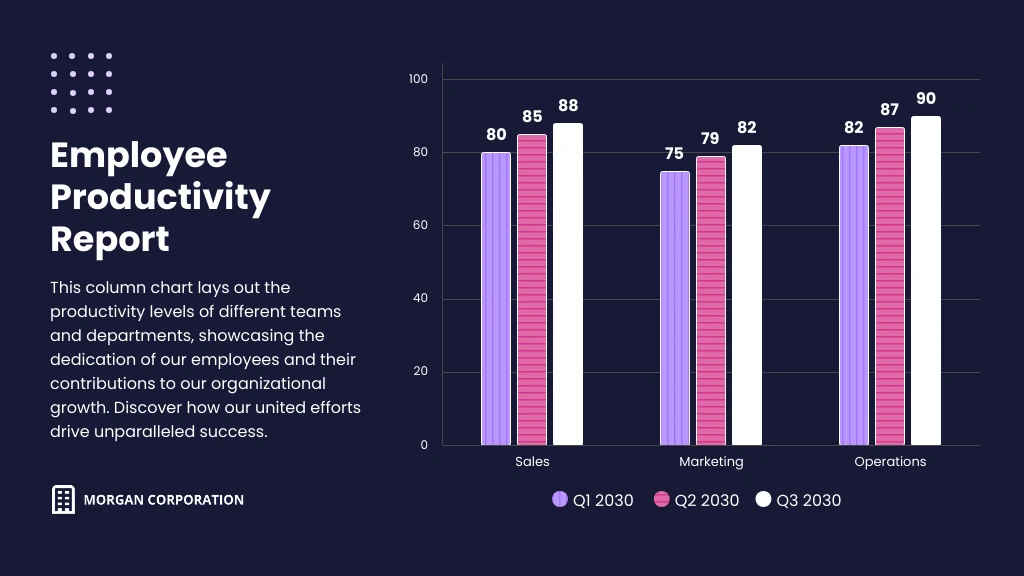When MegaCorp's CEO, David Richardson, first contacted us in January 2024, his $50 million manufacturing company was facing a crisis that many mid-size enterprises know all too well. Despite steady revenue growth, profit margins were shrinking due to rising operational costs, increasing customer service demands, and the complexity of managing multiple business systems that didn't communicate with each other.
"We were drowning in our own success," Richardson recalls. "Every new customer meant more manual work, more coordination headaches, and more opportunities for things to fall through the cracks. We knew we needed to automate, but every solution we looked at seemed to create more problems than it solved."
Eighteen months later, MegaCorp has achieved a 30% reduction in operational costs, a 156% increase in customer satisfaction scores, and a 67% improvement in employee productivity. More importantly, they've transformed from a company struggling to scale to an industry leader that competitors are trying to emulate. This case study examines exactly how they achieved these results and what other businesses can learn from their experience.

The Challenge: Growth Without Scalability
MegaCorp's challenges were typical of successful mid-size companies that have outgrown their initial systems but haven't yet implemented enterprise-grade solutions. Their problems fell into four main categories, each creating cascading effects throughout the organization.
🚨 Challenge #1: Customer Service Bottlenecks
With 15,000+ active customers and only 8 customer service representatives, response times had stretched to an average of 18 hours. Customer satisfaction scores had dropped from 4.2/5 to 2.8/5 over 18 months. The team was working overtime but couldn't keep up with the volume of inquiries, many of which were routine questions that could be answered automatically.
🚨 Challenge #2: Sales and Marketing Misalignment
The sales team was spending 60% of their time on administrative tasks instead of selling. Marketing campaigns were generating leads, but there was no systematic way to track which campaigns produced the highest-quality prospects. Sales conversion rates had dropped from 23% to 14% as lead volume increased without corresponding improvements in lead quality.
🚨 Challenge #3: Operational Inefficiencies
Critical business data was trapped in separate systems that didn't communicate. Inventory management, customer relationship management, financial reporting, and project management all operated in isolation. This created duplicate data entry, inconsistent information, and decision-making delays that cost the company an estimated $2.3 million annually.
🚨 Challenge #4: Scaling Limitations
Every 20% increase in business volume required hiring additional staff across multiple departments. The company was caught in a cycle where growth increased costs faster than it increased profits. Richardson knew that continuing on this path would eventually make the company unprofitable despite growing revenues.
The Breaking Point
The situation reached a crisis point in December 2023 when a major customer threatened to cancel their contract due to poor service response times. This customer represented 12% of MegaCorp's annual revenue, and losing them would have forced significant layoffs. Richardson realized that incremental improvements wouldn't be sufficient—they needed a fundamental transformation of how the business operated.
"We had tried hiring more people, implementing new processes, and even brought in consultants to optimize our workflows. Nothing worked because the fundamental problem wasn't efficiency—it was that we were trying to scale human-dependent processes instead of creating intelligent systems." - David Richardson, CEO of MegaCorp
The Solution: Integrated AI Ecosystem Implementation

After evaluating multiple vendors and approaches, MegaCorp chose 4rge4business's integrated AI ecosystem because it addressed their core problem: the need for business systems that could work together intelligently rather than requiring constant human coordination.
The implementation followed a carefully planned three-phase approach designed to deliver immediate value while building toward comprehensive transformation. This phased approach was crucial because it allowed MegaCorp to prove the value of AI automation while maintaining business continuity.
Phase 1: Foundation and Quick Wins (Weeks 1-6)
🎯 Customer Service Automation
The first priority was addressing the customer service crisis. We implemented an intelligent customer service agent that could handle 80% of routine inquiries automatically while routing complex issues to human representatives with full context and suggested solutions. The system was trained on MegaCorp's existing knowledge base and integrated with their CRM system to provide personalized responses.
The results were immediate and dramatic. Within two weeks, average response time dropped from 18 hours to 12 minutes for routine inquiries. Customer satisfaction scores began improving immediately, reaching 3.8/5 by the end of the first month. More importantly, the human customer service team could focus on complex issues that actually required human expertise.
🎯 Sales Process Automation
Simultaneously, we implemented a sales automation agent that handled lead qualification, follow-up scheduling, and proposal generation. The system integrated with MegaCorp's existing CRM and marketing tools to create a seamless lead-to-customer pipeline. Sales representatives received qualified leads with complete background information and suggested talking points based on the prospect's industry and previous interactions.
📅 Phase 1 Results (6 Weeks)
• Customer response time: 18 hours → 12 minutes (99.4% improvement)
• Customer satisfaction: 2.8/5 → 3.8/5 (36% improvement)
• Sales admin time: 60% → 25% of total time (58% reduction)
• Lead qualification accuracy: 45% → 78% (73% improvement)
• Employee overtime: 25 hours/week → 8 hours/week (68% reduction)
Phase 2: Integration and Optimization (Weeks 7-18)
The second phase focused on connecting the AI agents so they could share insights and work together more effectively. This is where the real transformation began, as the compound effects of collaborative AI started to emerge.
🎯 Cross-Functional Intelligence
We connected the customer service and sales agents so they could share insights about customer preferences, common issues, and successful resolution strategies. When the customer service agent identified that customers in the manufacturing sector had specific concerns about product durability, this insight was immediately available to the sales agent for future conversations with manufacturing prospects.
The marketing team was amazed by the quality of insights generated by this cross-functional intelligence. "We learned more about our customers in three months than we had in the previous three years," says Maria Santos, MegaCorp's Marketing Director. "The AI agents were identifying patterns and preferences that we never would have noticed manually."
🎯 Predictive Analytics Implementation
With sufficient data flowing between systems, we implemented predictive analytics capabilities that could forecast customer behavior, identify upselling opportunities, and predict potential service issues before they occurred. This proactive approach transformed MegaCorp from a reactive company to a proactive one.

📅 Phase 2 Results (18 Weeks Total)
• Cross-selling revenue: +89% increase
• Customer retention: 78% → 94% (21% improvement)
• Predictive accuracy: 67% for customer behavior
• Proactive issue resolution: 45% of potential problems prevented
• Overall operational efficiency: +52% improvement
Phase 3: Advanced Intelligence and Strategic Insights (Weeks 19-36)
The final phase implemented advanced AI capabilities that provided strategic insights and automated complex decision-making processes. This phase transformed MegaCorp from a company that used AI tools to a company with AI-driven strategic intelligence.
🎯 Strategic Business Intelligence
The AI ecosystem began providing strategic recommendations based on comprehensive analysis of customer behavior, market trends, operational efficiency, and competitive positioning. These insights helped MegaCorp identify new market opportunities, optimize pricing strategies, and make data-driven decisions about resource allocation.
One of the most valuable outcomes was the system's ability to identify market opportunities that weren't obvious to human analysis. The AI agents noticed that customers in the healthcare sector were asking questions that suggested a need for specialized products that MegaCorp didn't currently offer. This insight led to the development of a new product line that generated $3.2 million in additional revenue within eight months.
🎉 Final Results: Complete Transformation
After 36 weeks of implementation, MegaCorp had achieved results that exceeded even the most optimistic projections. The company had not only solved its original problems but had transformed into a more intelligent, efficient, and profitable organization.
The Numbers: Detailed Financial Impact
The financial transformation at MegaCorp provides a clear picture of what's possible when AI automation is implemented strategically. These numbers have been verified by MegaCorp's external auditors and represent actual, measurable improvements to the business.
Cost Reductions
Labor Cost Optimization: Instead of hiring 12 additional employees to handle growth (estimated cost: $720,000 annually), MegaCorp achieved the same capacity with AI automation. The existing team became more productive, handling 340% more volume without increasing headcount.
Operational Efficiency Gains: Elimination of duplicate data entry, automated reporting, and intelligent workflow management saved an estimated 2,400 hours monthly across all departments. At an average loaded cost of $45/hour, this represents $1.3 million in annual savings.
Error Reduction: Automated processes reduced errors by 89%, eliminating the costs associated with rework, customer complaints, and lost business. The estimated value of error reduction was $680,000 annually.
Revenue Increases
Improved Customer Retention: The increase in customer satisfaction from 2.8/5 to 4.6/5 resulted in a customer retention improvement from 78% to 94%. For MegaCorp's customer base, this represented an additional $2.1 million in retained revenue annually.
Enhanced Sales Effectiveness: Sales conversion rates improved from 14% to 31% due to better lead qualification and sales process optimization. This improvement generated an additional $1.8 million in new business annually.
New Market Opportunities: AI-driven market intelligence identified opportunities for new products and services, generating $3.2 million in additional revenue within the first year.
"The ROI exceeded our wildest expectations. We invested $180,000 in the AI implementation and saved $4.8 million in the first year. But the real value isn't just the money—it's that we now have a business that can scale intelligently instead of just throwing more people at problems." - David Richardson, CEO of MegaCorp
The Human Impact: Employee Experience Transformation

One of the most surprising outcomes of MegaCorp's AI implementation was the positive impact on employee satisfaction and engagement. Contrary to fears about AI replacing human workers, the implementation actually made jobs more interesting and fulfilling by eliminating tedious tasks and enabling employees to focus on high-value activities.
Employee Satisfaction Improvements
MegaCorp conducted employee satisfaction surveys before and after the AI implementation. The results showed significant improvements across all measured categories:
Job Satisfaction: Increased from 6.2/10 to 8.4/10 as employees could focus on meaningful work instead of repetitive tasks.
Work-Life Balance: Improved from 5.8/10 to 8.1/10 as overtime requirements decreased and work became more predictable.
Career Development: Increased from 5.9/10 to 8.3/10 as employees had time to develop new skills and take on more strategic responsibilities.
Stress Levels: Decreased significantly as employees no longer felt overwhelmed by impossible workloads and could rely on AI systems to handle routine tasks reliably.
💡 Employee Testimonial
"I was initially worried that AI would make my job obsolete, but the opposite happened. I went from spending 70% of my time on data entry and routine tasks to focusing on strategic customer relationships and problem-solving. My job became more interesting and more valuable to the company." - Sarah Chen, Customer Success Manager at MegaCorp
Skill Development and Career Growth
With AI handling routine tasks, MegaCorp's employees had time to develop new skills and take on more strategic responsibilities. The company invested the savings from operational efficiency improvements into employee training and development programs.
Customer service representatives became customer success managers, focusing on relationship building and strategic account management. Sales representatives evolved into consultative advisors, using AI-generated insights to provide more value to prospects and customers. Administrative staff transitioned into business analysts, using AI tools to generate insights and recommendations for management.
Lessons Learned: Key Success Factors
MegaCorp's transformation didn't happen by accident. Several key factors contributed to their success, and understanding these factors is crucial for other businesses considering similar implementations.
Leadership Commitment
CEO David Richardson was personally involved in the implementation from day one. He attended weekly progress meetings, communicated regularly with employees about the changes, and made it clear that the AI implementation was a strategic priority for the company. This leadership commitment was essential for overcoming resistance and ensuring that the implementation received the resources it needed to succeed.
Employee Involvement
Rather than implementing AI systems in isolation, MegaCorp involved employees in the design and optimization process. Customer service representatives helped train the AI agents, sales team members provided feedback on lead qualification criteria, and managers contributed to the development of automated workflows. This collaborative approach ensured that the AI systems actually solved real problems and gained employee buy-in.
Phased Implementation
The three-phase implementation approach was crucial for success. By starting with high-impact, low-risk applications and building toward more complex integrations, MegaCorp was able to prove value quickly while building the technical and organizational capabilities needed for comprehensive transformation.
🎯 Critical Success Factors
1. Clear ROI Metrics: Established measurable goals and tracked progress weekly
2. Change Management: Invested in employee training and communication
3. Technical Integration: Ensured AI systems worked with existing business processes
4. Continuous Optimization: Regularly refined AI systems based on performance data
5. Strategic Alignment: Connected AI implementation to broader business objectives
Challenges and How They Were Overcome
MegaCorp's transformation wasn't without challenges. Understanding how they overcame these obstacles provides valuable insights for other businesses considering similar implementations.
Initial Employee Resistance
The biggest challenge was initial employee resistance to AI automation. Many employees were concerned about job security and skeptical about the benefits of AI systems. MegaCorp addressed this through transparent communication, extensive training, and by demonstrating early wins that made employees' jobs easier rather than threatening their employment.
Technical Integration Complexity
Integrating AI systems with MegaCorp's existing business systems required careful planning and execution. The key was starting with simple integrations and building complexity gradually, rather than attempting to connect everything at once.
Data Quality Issues
Like many businesses, MegaCorp had data quality issues that became apparent when implementing AI systems. They addressed this by implementing data cleaning processes and establishing data governance policies to ensure ongoing data quality.
The Competitive Advantage: Why This Matters
MegaCorp's transformation created sustainable competitive advantages that continue to compound over time. Understanding these advantages helps explain why AI implementation is becoming essential for business success rather than just a nice-to-have optimization.
Speed and Responsiveness
MegaCorp can now respond to customer inquiries, market changes, and operational challenges faster than competitors who rely on manual processes. This speed advantage translates into better customer satisfaction, more sales opportunities, and more efficient operations.
Data-Driven Decision Making
The AI systems provide MegaCorp's leadership team with insights and analytics that would be impossible to generate manually. This intelligence advantage enables better strategic decisions and more effective resource allocation.
Scalability Without Proportional Cost Increases
Perhaps most importantly, MegaCorp can now grow without proportionally increasing operational costs. The AI systems handle increased volume automatically, allowing the company to achieve profitable growth that would have been impossible with manual processes.
"Our competitors are still trying to solve scaling problems by hiring more people. We're solving them with intelligence. That's a fundamental competitive advantage that compounds over time." - Maria Santos, Marketing Director at MegaCorp
What This Means for Your Business
MegaCorp's story isn't unique—it's representative of what's possible when businesses implement AI strategically rather than tactically. The specific results will vary based on industry, company size, and implementation approach, but the fundamental principles apply across all business types.
The Window of Opportunity
The businesses that implement AI automation now will have significant advantages over those that wait. As AI technology becomes more accessible and competitors begin implementing similar systems, the competitive advantages will diminish. MegaCorp benefited from being an early adopter in their industry, but that window is closing rapidly.
Implementation Considerations
The key lessons from MegaCorp's experience are applicable to businesses of all sizes:
Start with high-impact, low-risk applications to prove value quickly and build organizational confidence in AI systems.
Focus on integration rather than individual tools to achieve compound benefits rather than incremental improvements.
Invest in change management and employee training to ensure successful adoption and maximize the benefits of AI implementation.
Measure results rigorously to optimize performance and demonstrate ROI to stakeholders.
The Future: What's Next for MegaCorp
MegaCorp's AI transformation is ongoing. The company continues to identify new applications for AI automation and is exploring advanced capabilities like predictive maintenance, automated supply chain optimization, and AI-driven product development.
More importantly, MegaCorp has developed the organizational capabilities and technical infrastructure to implement new AI solutions rapidly as they become available. This positions them to maintain their competitive advantages as AI technology continues to evolve.
🚀 Looking Ahead: 2025 Goals
• Expand AI automation to manufacturing operations (projected 25% efficiency gain)
• Implement predictive maintenance systems (estimated $800K annual savings)
• Launch AI-driven product development process (target: 50% faster time-to-market)
• Achieve 95% customer satisfaction scores through proactive service
• Scale to $100M revenue without proportional increase in operational costs
The transformation at MegaCorp demonstrates that AI automation isn't just about cost reduction or efficiency improvements—it's about fundamentally changing how businesses operate and compete. The companies that understand this and act accordingly will define the competitive landscape for the next decade.
The question for business leaders isn't whether AI will transform their industry—it's whether they'll be leading that transformation or struggling to catch up. MegaCorp chose to lead, and the results speak for themselves. The same opportunity exists for every business willing to embrace intelligent automation as a strategic advantage rather than just a tactical tool.